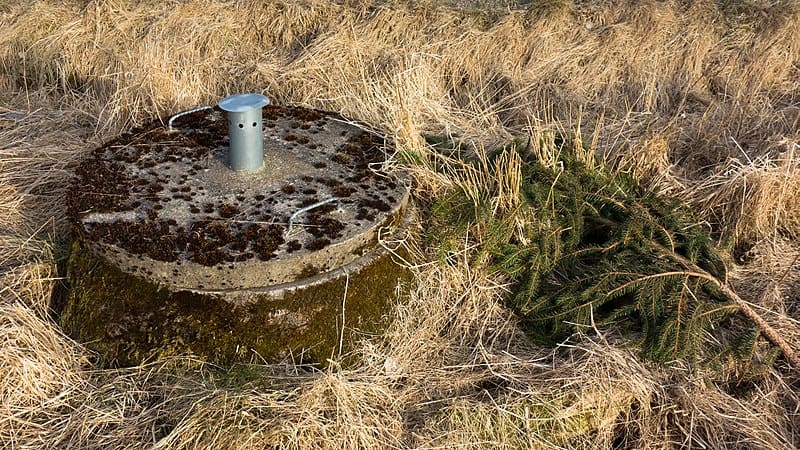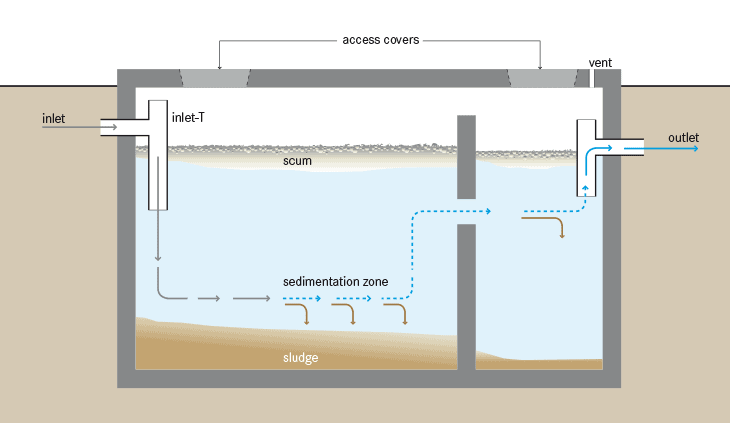How To Make Your Septic System Pass Inspection
If you are in the early stages of selling or refinancing the mortgage on your home or business property, expect to undergo a Title Five Inspection – and you should endeavor to pass it. A Title Five inspection is a standard requirement by the Board of Health and each state to ensure that individual septic systems are fully up to code. Failing a Title Five Inspection ultimately translates to costly repairs that can delay the sale or refinancing of your property. There are a few ways that can help you prepare your system for an inspection.
You are best advised to minimize the clogs within your system and keep so as to keep it running in the best condition possible. While complying with all septic tank regulations, permits, and everything else can be helpful, knowing that the inspection will focus mostly on the septic tank itself and the efficiency of the entire system should guide you.
Need A Septic Service Provider To Help Repair or Replace Your Failed Septic System?
Every one of your prospective buyers will, of course, want to know that everything is up to standard. To be prepared for a Title Five inspection, it is important to ensure that your septic tank is completely drained and adequately cleaned so that all toxic and hazardous elements are eliminated and that the waste is allowed to cycle correctly. Take note of the following elements commonly and thoroughly checked during a septic inspection:
Sludge. Some of the solid waste matter that enter the septic tank are more likely to settle at the base of the tank, forming what we refer to as sludge. This dense layer has the potential to become a large problem if this is left un-cleared through regular pumping and left to accumulate to excessive levels.
Scum. When substances like oils or grease enter your septic tank, they float to the top, creating a lighter layer known as scum. Here, the septic tank’s helpful bacteria will likewise work on digesting these substances.
Flow. There should be uninhibited flow within your septic tank should flow correctly. Any disruptions to the normal flow processes within your tank can cause backups or clogs that could likewise damage your pipes and plumbing systems.
Below are a few tips that should prepare your property for a successful Title Five Inspection.
- Stop using any bleach products and other harsh chemicals. Using such products to clean your sinks, tubs, or toilets could be killing off the good bacteria in your septic tank. This bacteria is highly vital for the effective digestion of waste matter. The efficient breakdown of the waste inside your septic tank contributes significantly in avoiding problematic clogs and back-ups in your property’s plumbing. Likewise, bleach can damage the cement structure of your septic tank and can gouge holes into the tank’s structure, over time. Such structural damage may require you to replace your entire tank. Start using all natural cleaning products, especially when you’re anticipating a regulatory septic inspection.
- Prevent flooding your system with excessive water use. Expect your Title 5 Inspector to run water into your septic system to check that it is properly draining out into the drainfield. With this, it is important that you do not overload your system with excessive water, especially within a week or two before your inspection date. High volumes of water in your drainfield will prevent the inspector’s test water from properly absorbing and can ultimately result to a failed inspection. One way to do this is to cut down on or space your laundry loads over several days. Doing too much laundry at once can be overwhelming to your septic system and cause the drains to back up. This isn’t good for your septic system or your Title 5 inspection.
- Promptly address leaks in your plumbing. Even tiny, seemingly negligible leaks can create a costly problem over time.
- Avoid using your garbage disposal unit. A septic system is not designed to break down food from garbage disposal units. If you cannot altogether avoid owning a garbage disposal unit, make provisions that your disposal unit does not empty out into your septic tank. Garbage disposal units produce waste that can be overwhelming to your septic system and almost always results in drain clogs.
- Pay attention to your landscape. Keep trees or shrubs as far away from your septic system. The infiltration of tree roots into one’s septic tank system is another common problem for you would like to avoid for your system. Tree roots are naturally drawn to the high levels of nutrients and moisture waste in septic tanks and lines. When tree roots gradually grow around and into your septic tanks and lines, the roots can encroach on small leaks and cracks, eventually aggravating them over time. If roots do end up blocking a pipe, there is a machine that can cut away the roots. But if the tree is not removed, your pipes will eventually get clogged again.
- Schedule and commit to routine septic pumping. Have your tank pumped every 3 to 5 years. Though it’s true that pumping out your septic system is not a requirement of the Title 5 Inspection process, doing so will go towards a smooth and successful inspection. A clear septic tank is much easier to inspect, eliminating any “evidence” of whatever signs of misuse (like non-septic safe items or substances). The simple rule of thumb is that nothing that cannot be broken down or digested naturally should ever find its way inside a septic tank for your inspector to see. Or ever.
Other Things to Note Prior to a Septic Inspection
| Check: | For: | |||
| Conventional Systems | ||||
| ü | Date of last pump out | Sludge level. Sludge accumulates on the tank’s bottom and should not occupy more than 1/3 of the tank’s total volume or rise to the level of the baffles. | ||
| ü | Septic tank and drainfield location | Ample distance from wells, streams, and other water sources. Water lines should be at least 10 feet from all components of the septic system. | ||
| ü | Tank Size | Sufficient capacity. Ensure that your septic tank is large enough for the facility that it serves. A four-bedroom home, for example, typically needs a 1,200-gallon tank. The more occupants, the larger the tank required. | ||
| ü | Ground Surface | Liquid waste that may have seeped out. This indicates that your system is overloaded. Ensure that your tank is watertight so wastewater does not contaminate your groundwater, and groundwater does not flow into the tank, causing it to overfill. | ||
| ü | Riser Lids | Cracks or breakage. Ensure that these are securely placed. | ||
| ü | Baffles | Any signs of damage or displacement. Ensure that these are securely connected to tank’s inlet and outlet pipes. | ||
| ü | Drain Lines | Even flow. Drain lines should each receive the consistent volumes of wastewater. Check your distribution box. If the box becomes tipped or clogged, it will allocate effluent disproportionately, potentially flooding sections of your drainfield. |
The same due diligence applies if you are the party doing the buying of any property. You never truly know what the previous occupants of the property have flushed down the toilet and what could be in the septic tank, do you? It is in your interest as a prospective buyer to insist that the septic system be inspected before any purchase is finalized, if it has not been done recently.
And even when you do own the property with no intention to sell, your septic system should be inspected once every year. Moreso if you’re putting your property on the market for sale. A passed Title Five Inspection will only enhance your property’s value and help you avoid any liability issues that might result from a malfunctioning septic system.
What Happens During a Septic Inspection?
If you own a property that relies on a septic tank system, it is extremely essential to perform septic tank maintenance on a regular basis. At the first signs of septic tank problems, you should also promptly schedule a septic inspection for proper diagnosis. During a septic inspection, your contracted septic technician should be able to locate and diagnose any problem within your system. A good company offering septic tank care is ideally also able to provide you with a full range of inspection and repair services. Here is a quick look at what you can expect during a septic system inspection.
Consultation. The first step of a septic system inspection is a conversation with the property owner. One of the first things your septic inspector will do is to talk with you in order to learn more about the maintenance history of your septic system, as well as any current problems you might have detected. By discussing the condition of the septic system prior to the actual inspection, the inspector can gain an insight as to what to look for during the procedure.
Visual Inspection. The next step in a septic inspection is a visual assessment of the entire septic system. The inspecting technician will use tools, such as mirrors and cameras, to get a visual inside the septic tank and filtration systems. By using cameras to take a look inside the septic tank, the inspector will be able to locate the source of any leaks, clogs, or other structural damages that might be present.
Drainfield Test. Once the visual inspection has been completed, the next phase of the septic system inspection is the drainfield test. During this phase, the inspector will dig holes in the ground within the areas surrounding the septic system. If the holes are found to contain standing water, this is an indication that the septic system is in need of maintenance or repair. A septic system inspection can help you catch a small issue before it balloons into an expensive problem.
How Much Does a Septic Inspection Cost?
It is important to remain aware about when you need to have your septic tank pumped. Septic tanks collect and process wastewater carrying both solid and liquid wastes, later allowing the effluent to flow out into the drainfield. Over time, the solid wastes build up within the tank and need to be pumped out. If the accumulated solid matter is not pumped out, these can be forced out of the tank and end up clogging the drainfield, causing it to malfunction. Replacing a septic system can cost you anywhere between $7,000 and $25,000, plus you need to process a permit from your local government.
Depending on the location of your property, having your septic system inspected may cost around $100 to $250. Getting your tank pumped usually costs between $300 and $400 (more, if service charge is by the gallon). Your septic tank will need to be uncovered for either process. You can do this yourself, or pay the pumper to do it, which is more advisable. The cost for uncovering a septic tank varies and can range from $150 to $300, depending on your tank’s depth. Yet, at any given day, these are still substantially better amounts compared to the cost of needing to replace your drainfield for $2,500 up to $10,000.
Are Septic Inspections Necessary?
Septic Inspections are not required, but are strongly recommended. As a buyer or renter in the market for an apartment or a home, you will want to check and make sure that the toilets flush and that drains take in water well. If you’re an apartment renter, you likely won’t be asking about the septic tank, but as a property owner, you will own the property and the septic tank underneath it, which means that you are fully responsible for everything within the premises. If you are not selling your property, it’s still best to submit your septic system to regular inspections. Getting that septic system inspection is, ultimately, your call, but do be guided by a few factors to consider in making the call. First, the age of your house or building, regardless if it’s been vacant for a long period or not, and next, if your tank has been serviced regularly. And even if all of those items check out, it’s still a good idea to have your septic system inspected. Be practical: how would you like to have a mortgage on a property that’s uninhabitable?
Simply put, even if a system appears to be functioning just fine, septic systems must be inspected on a routine basis. Typical septic systems are ideally inspected by a professional at least every one to three years, and pumped as recommended by the inspector. Though generally, pumping every three to five years is a good average. Septic inspections assess both the present and future performance of an existing system – and just because a system appears to be in good working condition at the present time is not entirely a guarantee that it will continue to be as healthy throughout the coming weeks.
Septic systems require routine monitoring and regular maintenance to ensure that they work properly and will never pose health or environmental risks via pollutants in property wastewater and groundwater. Keeping your septic system well-inspected diminishes the spread of infection and disease, not yet mentioning structural hazards. When a septic system or its soil absorption field reaches maximum capacity, sewage can back up into your facility or surface to your groundsoil.
If all that’s been earlier described still do not suggest sufficient incentive to have your septic system inspected, it pays to know that failing septic systems could be quite expensive to repair or replace, and poor maintenance is often the culprit of such expensive repairs. What’s more, failing septic systems could lower your property value and possibly even bode lawsuits in your future.
Septic Questions to Ask When Buying a Property
If you’re in the market for a new home or business property and you’re touring a facility, make sure that you bring up the subject of the septic tank. You had better ask:
- how well it has been maintained over the years
- if the septic tank has been adequately inspected by a professional
- if the existing septic system has recently been submitted to an open pit test
While you’re touring the external grounds of the property you are considering, observe for any odd smells wafting in the air. If in case you catch anything that smells suspicious, never hesitate to inquire about it. Be on the lookout, too, for any patches of grass or vegetation that appear greener or lusher than the rest. Keep an eye out for water that pools directly above where the septic tank is buried; this could be an indication of sewage leaks which can be a serious problem.
Leave no stone unturned and no question un-asked when it comes to the septic system of any property that you’re considering to acquire. It is your right and it is your responsibility. The right questions and relevant information can truly keep you from wasting your time and your investment.
In a nutshell, a septic system receives, treats, and disposes wastewater and solid wastes from a home or establishment’s plumbing system. Solids are partially broken down into sludge and are separated from effluent (middle water) and scum (fat, oil, and grease). Effluent regularly leaves the tank and travels into a drainfield where it is naturally filtered by bacteria before it re-enters the groundwater. Scum and sludge must be pumped out from the septic tank periodically and should never find their way into the drainfield. Septic system inspections should be performed once annually to ensure proper functions, as earlier described. The septic tank is the most expensive fixture of any home or business property and its lifespan is significantly improved if it is kept with proper inspection and maintenance.
Visit our State Directory For Local Septic Service Providers
https://www.callbrownies.com/blog/2018/june/the-guidebook-to-passing-a-septic-system-inspect/
https://inspectapedia.com/septic/Sewage_Contaminants.php
https://www.doh.wa.gov/Portals/1/Documents/4450/WW-SM-007.pdf
https://www.nachi.org/inspecting-septic-systems.htm
https://www.co.thurston.wa.us/health/ehoss/pdf/pumping_guide.pdf
https://www.thumbtack.com/p/septic-inspection-cost
https://www.ses-company.com/resource-center/why-septic-system-inspections-are-important.php











